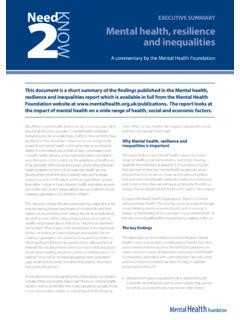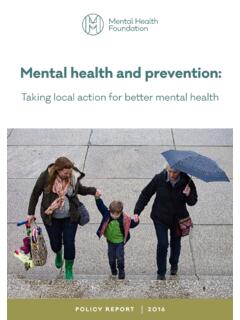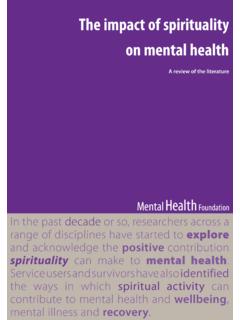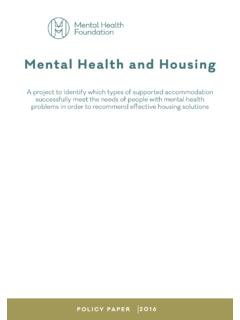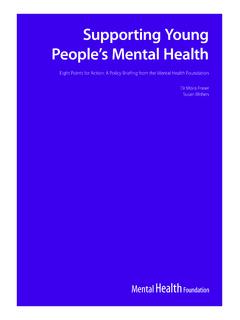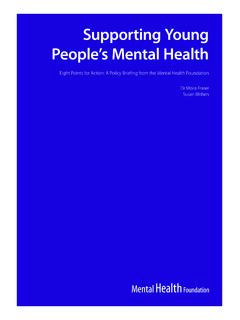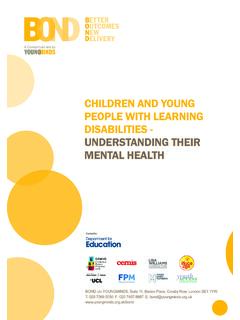Transcription of How everyone can flourish equally - Mental Health …
1 Tackling social inequalities to reduce Mental Health problems: How everyone can flourish equally A Mental Health Foundation report Tackling social inequalities to reduce Mental Health problems This report was led by Dr Shari McDaid & Dr Antonis Kousoulis Substantial contributions to this or previous versions were made by Lucy Thorpe, Victoria Zamperoni, Amy Pollard, Emily Wooster and Isabella Goldie. Additional feedback and input was provided by Marguerite Regan, Jonathan Campion, Jenny Edwards, Christine Burke, Ed Davie, Emily Satinsky, Jo Ackerman, Claire Niedzwiedz and Mark Rowland. This report should be read alongside the long reference Mental Health inequalities ' report by the Mental Health Foundation to be published in January 2020. Contents 1. Contents 4 Foreword 6 Introduction 8 Note on the limits of our knowledge 10 1. The nature and extent of Mental Health inequalities 10 The social gradient in Mental Health 12 How do socioeconomic inequalities lead to Mental Health problems?
2 14 Grouping inequalities 17 2. Mapping the problem: inequalities that influence Mental Health 17 Economic influences 18 Living in poverty/debt/income inequality 19 Employment and unemployment 21 Education level 23 Other relational influences 23 Cultural/social group status Tackling social inequalities to reduce Mental Health problems 2. 27 Adverse childhood experiences (ACEs). 30 Adverse experiences in adulthood 33 Health , disability and ageing 36 Ecological influences 40 3. Tackling socioeconomic inequalities to reduce Mental Health problems 41 Why all sectors of society must be involved in preventing Mental Health problems 46 addressing the socioeconomic drivers of poor Mental Health 46 Act with proportionate universalism 46 Adopt a whole-community approach 48 Mobilise community assets 49 Work together in equal partnership 50 Prioritise poverty and income inequality 50 Provide adequate housing and access to green/blue space 51 Protect people from discrimination, abuse and other adversity Contents 3.
3 52 Reduce substance and alcohol misuse 53 Improve the educational attainment of teenagers 54 Interventions on an individual level 57 Conclusion 61 References Tackling social inequalities to reduce Mental Health problems 4. Foreword Social inequalities are all around us: poverty and financial strain, racism, sexism, bullying based on sexual orientation, homelessness, and social exclusion due to disability or age, to name just a handful. Y. et discussion on the causes of Mental Health problems often focusses on individual factors. Rarely does public discourse acknowledge that the circumstances in which we are born, raised and live profoundly affect our chances of having good Mental Health . Tackling social inequalities seeks to shine a light on the social inequalities that put too many people at a disadvantage in achieving Mental Health and wellbeing. We do not all have an equal opportunity to flourish . Rather, too many children start from a position of disadvantage in the journey towards good Mental Health , too many adults are hindered by circumstances beyond their control.
4 The evidence gathered in this paper will help us to Foreword 5. understand what types of social inequalities negatively affect Mental Health and how. For the Foundation, an inequalities approach is fundamental to how we will achieve our prevention strategy. One could call it having a heart for inequalities ', or using an inequalities lens'. Through this paper, the Foundation affirms that, firstly, we will consider inequalities and their influence on Mental Health in all of our prevention work. By taking account of inequalities in our prevention programmes, we seek to model a process for adoption by all Government Departments, public agencies and service providers, who should all have a heart for inequalities '. Secondly, the Foundation will seek to undertake activities that specifically promote social justice and address social and economic inequalities . In doing so we hope to demonstrate effective, scalable solutions that minimise the effects of disadvantage and foster resilience in people with experience of inequality.
5 Tackling social inequalities sets out a framework for social justice work to prevent Mental Health problems. Now, it is up to all of us to heed its messages and carry a heart for inequalities ' into all we do to prevent people from experiencing Mental distress. Dr Jacqui Dyer MBE. President of the Mental Health Foundation Tackling social inequalities to reduce Mental Health problems 6. Introduction We all have Mental Health and we all can experience Mental Health problems, whatever our background or walk of life. But the risks of Mental ill- Health are not equally distributed. T. he likelihood of our developing a Mental Health problem is influenced by our biological makeup, and by the circumstances in which we are born, grow, live and age. Those who face the greatest disadvantages in life also face the greatest risks to their Mental Health . This unequal distribution of risk to our Mental Health is what we call Mental Health inequalities . This report describes the extent of inequalities that contribute to poor Mental Health in the UK today.
6 It explains how certain circumstances interact with our individual risk and discusses communities that are facing vulnerabilities. It makes a clearly evidenced case for why addressing inequalities can help to reduce the prevalence of Mental Health problems and makes a strong call for cross-sectoral action on Mental Health . The report concludes with proposed actions to address Mental Health inequalities . 7. Child adversity /. Flourishing trauma unequally Unemployed /. economically strained Economically secure /. well-housed / majority culture / well-educated Minority status Disabiity / Poor Health condition environment Tackling social inequalities to reduce Mental Health problems 8. For centuries, Mental ill- Health has been overlooked, misunderstood, stigmatised and, for a long time, inappropriately treated. Much of this is now changing, although misunderstanding and stigma are not yet things of the past. As a society, we have some way to go before the extent of Mental Health problems and their damage to our individual and collective wellbeing is fully recognised and comprehensively responded to.
7 Reducing Mental Health problems and their effects warrants the most urgent and committed public Health effort of our generation. As this paper will show, addressing social, economic, cultural and environmental inequalities will take us a long way towards achieving this goal. Note on the limits of our knowledge Every attempt has been made for this report as well as the longer reference report supporting it to be based on some of the best available evidence on the issue of Mental Health inequalities . There is indeed a wealth of evidence in relation to these social, economic, cultural and environmental circumstances and their impact on our Mental Health . However, it should be acknowledged that, both historically and to this day, there has been an underrepresentation of women and minority communities in 4 The reasons for this are structural and complex, but they include, among others, cultural and gender biases, institutional racism, lack of diversity in the funding bodies, and underinvestment at a government Introduction 9.
8 Level. For example, prominent disability activist Jenny Morris has argued that research by non-disabled people has tended to focus too much on impairment as a cause of depression, rather than researching the Mental Health effects of disability- related prejudice and This is leading to a smaller evidence base on the experience of Mental ill- Health of these disadvantaged groups and we should be careful not to associate this smaller body of research and the relative lack of data with the actual very real disproportionate risk certain population groups are exposed to. Looking at these drivers of inequality in this report individually provides valuable insight into the ways that society can affect our Mental Health . However, people are multifaceted, and focusing on one aspect of group identity or experience at the expense of another can sometimes mean we miss a more detailed and diverse understanding of how things like life experiences, disability, sexual orientation, gender and gender identity, and racial or ethnic identity interact to affect people's Mental Health .
9 In general, to fully develop our understanding, more research is needed that takes this intersectional approach. Tackling social inequalities to reduce Mental Health problems 10. 1. The nature and extent of Mental Health inequalities The social gradient in Mental Health I. n general, people living in financial hardship are at increased risk of Mental Health problems and lower Mental This link between poverty and Mental Health has been recognised for many years and is well The relationship operates in two directions: being poor can bring about Mental Health problems (most commonly anxiety and depression), but Mental Health problems can also lead people into poverty due to discrimination in employment and reduced ability to work. More recent discussion has focused on income inequality (the unequal distribution of income across society) as a cause of poor Mental Health . People in the lowest socioeconomic groups have worse Health than those in the middle groups, who in turn have worse Health than those in the This social gradient' means that Mental Health problems are more common further down the social This is evident even in early childhood, with children as young as three and five 1.
10 The nature and extent of Mental Health inequalities 11. years of age showing a social gradient for socioemotional and behavioural Importantly, it has been argued that the greater the income inequality in a society, the worse the social outcomes for that society as a The social gradient is not a purely economic term, as it is compounded by cultural, relational and environmental influences. Health , risk factors and access to the Health system: The odds are stacked in favour of the better-off Health systems and policies Good access to Health system Poor access to Good Health Health system More Poor protective Health factors More risk factors Adapted from OECD, 2019. Beyond financial circumstances and economic position, a variety of other social circumstances are known to be Tackling social inequalities to reduce Mental Health problems 12. associated with poor Mental Health . These circumstances can relate to being part of a disadvantaged group (for example BAME (Black, Asian and Minority Ethnic) communities or LGBT+), being female, having a long-term Health condition, or having certain experiences.
